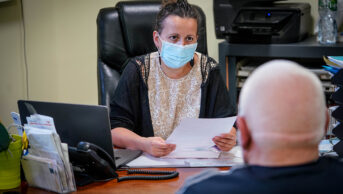
Paul Souders / Getty Images
Some primary care pharmacists offer prescribing advice to GPs, with a focus on switching to more cost-effective products. But there is greater scope for pharmacists qualified as prescribers to run clinics and manage their own caseloads, especially for patients with long-term conditions or those patients taking several medicines — so-called polypharmacy.
A briefing document from the Royal Pharmaceutical Society (RPS), seen by The Pharmaceutical Journal ahead of its dissemination to policymakers, makes the case for pharmacists offering prescribing advice as part of general practice services.
Pharmacists forming part of the clinical team within GP surgeries could do much to address the workload issues being faced by GPs. Royal College of General Practitioners chairman Maureen Baker has described a desperate shortage of GPs in many parts of the UK, with general practice “teetering on the brink of collapse”.
Conversely, the Centre for Workforce Intelligence, commissioned by the government to analyse future workforce requirements for healthcare, public health and social care in England, has predicted an oversupply of pharmacists, totalling as many as 19,000 by 2040. So, pharmacists could be seen as part of the solution to the GP crisis.
Among the models set out by the RPS, pharmacists could be employed directly by GP surgeries, run clinics or be contracted from local community pharmacies.
The notion of individual pharmacists having a direct role within GP practices may be perceived as a threat by community pharmacy businesses and their representative bodies. Yet, whatever models are adopted — and there is scope for different ones depending on local needs — there are advantages to having pharmacists work this way.
The practice pharmacist could act as a key contact for hospitals (e.g. medical admissions units) and community pharmacists on medicines-related issues — helping to ensure patients transfer safely between care settings, thereby preventing hospital readmissions. Furthermore, if practice pharmacists can prove their worth to the GPs who employ them, this may boost the recognition of pharmacists more broadly and make community pharmacies more attractive collaborators for general practice.
Pharmacists need to be clear in how they can support GPs, such as helping doctors meet Quality and Outcomes Framework targets, which represent one of the main sources of potential income for medical contractors in the UK. And GPs must think creatively about how to deal with the pressures they are facing.


